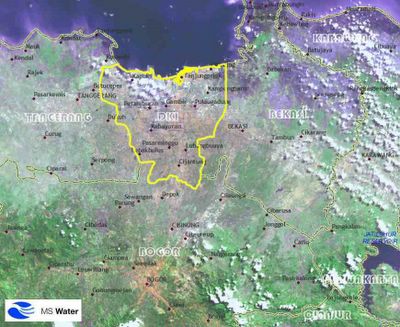Waste management needs revamping
Source: The Jakarta Post

The Jakarta Post, Jakarta
An environmental activist and a toxic waste expert called on the city administration on Saturday to decentralize waste management in order to reduce thousands of cubic meters of garbage from being dumped into the city's rivers.
"I think the city administration needs to engage communities and family units in managing the waste, since they are the ones who know well about their neighborhoods. Make them responsible," artist and environmental activist Iga Mawarni said during an Earth Day commemoration on Saturday.
To highlight water pollution in the city, the World Wildlife Fund (WWF), in cooperation with the environment student group Mapala from the University of Indonesia, made a four-minute video presentation showing the changing purity of water in the Ciliwung river.
Samples of water were taken from seven spots from the river upstream at Desa Cempaka village in Bogor, West Java, to its downstream at Muara Angke in North Jakarta.
"The water purity starts to change in Puncak, where kiosks throw their garbage into the river, then it gets darker in Central Jakarta, where many offices and industries channel their waste into the river," said Kriskuarto Tutuko, a member of Mapalla UI, who did the documentation.
Iga suggested that community units, especially those located along city river banks, be motivated to manage their waste by giving them rewards and punishments.
"If a community unit fails to manage their garbage, they should get sanctions," the jazz singer said, adding that mechanisms for implementing the idea should be discussed together by the central government, the city administration and representatives of city residents.
The city has 2,663 community units, which could be a great asset to helping to manage the more than 25,000 cubic meters of waste that the capital produces everyday. Must of the waste is believed to be dumped into the city's rivers, aggravating floods during the rainy season.
Expert Lukas Adhiakso, meanwhile, said that toxic waste in the city's 13 rivers has already reached alarming levels.
"We have all kinds of waste starting from households waste, pesticides to industrial and organic waste. All of these elements reduce the content of oxygen in the rivers and cause deaths to almost any forms of life in the river. The only thing that can survive are bacteria, which cause many kinds of disease," said Lukas, who has a doctorate in toxicology.
He also suggested that the city administration require all households in the capital to separate their waste into organic and inorganic, and encourage communities to compost organic waste.
"The waste composting should be decentralized, meaning it should not be done at a final dumping site, but at the neighborhood level, such as a community unit," said Lukas, who works for the United Nations Development Program (UNDP).
"Currently garbage is transferred from one dumping site to another, which actually does not reduce the amount of garbage. The problem is if one dumping site has problem, the whole waste dumping chain is interrupted, and rivers become the alternative dumping site," he said.
Garbage disposal is now handled by the city administration, with communities only playing marginal roles.


<< Home